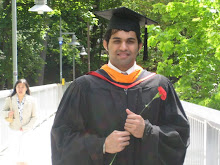"What is a nation?" ; "Am I a part of this nation or is it only represented by the land and the symbols?" asked two students from Jawaharlal Nehru University on a late night talk show. I had never thought I would say this, but it shook my 32 year old belief of what "respect to nation" constitutes. "Whom does the armed forces of India protect? Is it the land mass or the way of life professed by our liberal Constitution?". This guy was questioning the basis of my entire equation with my nation and bringing a question mark over my understanding of what a citizen is how does she/he relate to the nation and its symbols. At first, I laughed at the questions raised as possible diversion sought by these "kids" in order to get away from answering on the substantive points raised on "nationalism" or lack of it as depicted on the University campus in the days leading up this talk show.
That night, I took a second pass at the aforementioned questions and it still did not make sense to me. I somehow could to shake off the feeling that there was some issue I was not understanding. There is some aspect of this debate that I am unaware of which if known would help me contextualize this entire episode with a fresh perspective. I went online and spent a few hours reading up on literature written by authors who were self professed Marxists. As a capitalist who believes in a welfare state to some extent, I have always scoffed at the ideological left as "ideas of the past" and never has the time or inclination to read any left leaning authors. Free market economy is all I ever believed in. Upon reading several articles by very famed authors, it began to dawn upon me that the assumptions that I have always had regarding a nation and its citizen is open to alternative interpretations. I took a third pass at the statements I had heard the student raise earlier and then it slowly began to sink in.
It is an accepted notion that the flag / emblem / national anthem / Government represent the nation and it is expected that every citizen shown his respect towards the nation by respecting these symbols. It is a commonly heard that the "armed forces fight for our flag" and it somehow is assumed that our citizenry is evaluated by how respectfully we treat these symbols that are revered by our armed forces. Well, until now. Today, I ask this question. Our constitution says "We the people of India are the sovereign" and it means that the group of people as a collective make what we call a nation. It also brings into focus the point that student wanted to make- " harming your fellow citizen amounts to harming the nation" for each one of us are contributing as a part of it. This was a very novel way, an alternative way of thought process that helps understand the left ideology of investing in people as a means of nation building. I must say it helps me understand and put a fresh perspective to a lot of noise around the University.
If only, we could let these students fight each other using alternative ideas which will help build the future nation. Instead of clamping down upon ideas and calling those opposing your views as "anti national", it would be useful to understand the alternative point of view and then debate it with your point of view. The act of sedition comes into picture when it is my nation versus them. Modern democracies must do away with such archaic colonial laws that make no sense in today's world except to act as a tool in hands of Governments to impede the flow of free ideas - revolutionary ideas.
I want to sign off with couple of points:
1. The United States allows its citizens free speech as a constitutional right with no limits. They can burn their flag, desecrate any holy book or even the constitution and yet no Government could ever jail them.
2. The United states allows its citizen to bear arms and attempt to overthrow its Government in an armed struggle and it would not constitute as a crime under law.
Look how far away we stand in terms of being liberal and being a democracy.
Signing off.

No comments:
Post a Comment